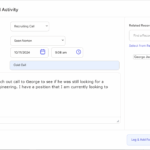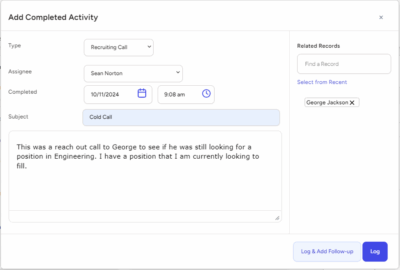Welcome to the fourth part of our series regarding recruiting challenges for professional recruiters and search consultants! It used to be that most people worked in a physical office and only a small minority of the workforce plied their trade remotely.
Alas, that is no longer the case . . . and this presents a challenge, both for employers and also for professional recruiters and search consultants.
Needless to say, the world of work has undergone a seismic shift in recent years, with remote work emerging as a dominant force in the job market. This paradigm shift brings both opportunities and challenges for professionals in the recruiting and search consultancy field.
As companies embrace the remote work model, recruiters find themselves navigating uncharted waters, facing unique challenges in talent acquisition, onboarding, and maintaining candidate engagement. In this blog post, we’ll examine the multifaceted dynamics of remote work, exploring the recruiting challenges involved and proposing effective solutions for recruiters and search consultants.
Remote Work Dynamics: Recruitment Strategies
Traditional recruitment strategies may not seamlessly translate to the remote work environment. Professional recruiters need to reassess their approach to candidate sourcing, assessment, and engagement. The geographical constraints that once defined recruitment processes have blurred, demanding a more agile and tech-savvy approach.
Solution: Invest in advanced applicant tracking systems (ATS) and recruitment software that streamline remote hiring processes. Leverage AI-powered tools to identify suitable candidates, assess their skills, and facilitate virtual interviews. Additionally, adapt your sourcing strategies to focus on online platforms, job boards, and professional networks that cater to remote job seekers.
Assessing Remote Candidate Competencies
One of the significant challenges recruiters face in the remote work landscape is accurately assessing a candidate’s competencies without traditional in-person interactions. Evaluating soft skills, cultural fit, and communication abilities becomes more complex when interactions are confined to virtual platforms.
Solution: Implement a multi-faceted assessment approach that includes video interviews, skill-based assessments, and scenario-based evaluations. Leverage technology for psychometric testing and personality assessments to gain insights into a candidate’s suitability for remote collaboration. Establish clear communication channels to gauge a candidate’s ability to articulate ideas virtually.
Building Remote Company Culture
Maintaining a strong company culture is challenging when teams are dispersed geographically. Recruiters must ensure that candidates not only possess the required skills but also align with the company’s values and can thrive in a remote work environment.
Solution: Prioritize culture fit assessments during the recruitment process. Conduct virtual company tours, facilitate meetings with key team members, and provide candidates with insights into the company’s remote work policies and practices. Emphasize communication and collaboration skills to identify candidates who can actively contribute to a positive remote work culture.
Remote Onboarding Challenges
Onboarding new employees remotely presents a unique set of challenges. The absence of physical presence can hinder the assimilation of organizational culture, hinder relationship building, and delay the integration of new hires into their roles.
Solution: Develop a comprehensive remote onboarding program that includes virtual orientation sessions, mentorship programs, and interactive training modules. Provide new hires with access to collaboration tools, documentation, and resources that facilitate a smooth transition into their roles. Encourage regular check-ins with managers and team members to foster a sense of belonging.
Effective Communication in a Virtual Environment
Communication is the cornerstone of successful remote work. Recruiters need to evaluate a candidate’s ability to communicate effectively in a virtual setting, ensuring they can convey ideas, collaborate with team members, and stay connected despite physical distance.
Solution: Assess communication skills during the interview process, emphasizing a candidate’s experience with virtual communication tools, clarity in expressing ideas, and active listening. Provide training resources for candidates to enhance their virtual communication skills, and encourage ongoing communication and feedback within the organization.
Managing Remote Team Dynamics
Recruiters are not only responsible for placing candidates but also for ensuring the success of those placements within remote teams. Understanding the nuances of remote team dynamics is crucial for identifying candidates who can thrive in this environment.
Solution: Collaborate closely with hiring managers to gain insights into their remote team dynamics. Seek feedback from existing remote team members to understand the key attributes that contribute to success in a virtual setting. Use this information to tailor recruitment strategies and identify candidates who possess the necessary skills and characteristics for effective remote collaboration.
Balancing Flexibility and Productivity
While remote work offers flexibility, recruiters must also ensure that candidates can maintain high levels of productivity and meet organizational goals. Striking the right balance between flexibility and accountability is a delicate task.
Solution: During the recruitment process, assess a candidate’s ability to manage time effectively, meet deadlines, and maintain a high level of productivity in a remote setting. Look for candidates with a proven track record of remote work or those who demonstrate strong self-motivation and discipline. Clearly communicate performance expectations and ensure that candidates understand the importance of accountability in a remote work environment.
Overcoming Technology Barriers
Technology is both an enabler and a potential barrier in the remote work landscape. Recruiters must navigate various digital tools and platforms, ensuring seamless communication and collaboration throughout the recruitment process.
Solution: Invest in training programs for recruiters to enhance their digital literacy and proficiency with remote collaboration tools. Leverage advanced recruitment technologies, such as virtual reality (VR) for immersive assessments and AI-driven tools for candidate screening. Stay informed about emerging technologies that can enhance the efficiency and effectiveness of remote recruitment processes.
Adapting to a Global Talent Pool
Remote work transcends geographical boundaries, allowing recruiters to tap into a global talent pool. However, this expansion brings challenges related to time zones, cultural differences, and legal considerations.
Solution: Implement flexible scheduling practices to accommodate candidates from different time zones. Provide cultural sensitivity training to recruiters and hiring managers to navigate diverse work cultures. Stay informed about international labor laws and compliance requirements to ensure a seamless hiring process for candidates across borders.
Measuring Remote Employee Engagement
Employee engagement is a critical factor in the success of remote work arrangements. Recruiters need to go beyond the initial recruitment phase and focus on strategies to measure and enhance ongoing employee engagement in a virtual setting.
Solution: Implement regular feedback mechanisms, surveys, and performance evaluations to gauge employee satisfaction and engagement. Foster a culture of open communication and transparency within the organization. Encourage the use of virtual team-building activities and initiatives to strengthen bonds among remote team members.
As the remote work landscape continues to evolve, professional recruiters and search consultants must adapt their strategies to meet the unique challenges posed by this paradigm shift. By embracing technology, refining assessment processes, and prioritizing effective communication, recruiters can not only overcome these challenges but also thrive in the dynamic world of remote work. The key lies in staying agile, continuously learning, and leveraging innovative solutions to build successful and sustainable remote workforces for organizations around the globe.








